Blockchain technology has revolutionized the way we think about data storage, security, and transparency. Initially known as the underlying technology behind cryptocurrencies like Bitcoin, blockchain has paved the way for numerous use cases across various industries. From supply chain management to healthcare record-keeping, blockchain use cases transform how we do business.
At Aloa, a software outsourcing firm, we have proven experience in the blockchain technology industry. With our expertise in building a blockchain application, we ensure to provide the best insights to clients seeking innovative solutions in this field. Our team keeps abreast of the latest industry trends and innovations, assuring clients to benefit from advanced technology and leverage the blockchain use cases for streamlined operations.
In this blog, we will explore eight key ways to apply blockchain technology in 2024 and examine how it benefits different industries. Afterward, you will know the blockchain use cases, benefits, and features. With this knowledge, you will be well-equipped to apply blockchain technology to your company.
Let's dive in!
8+ Ways to Apply Blockchain Use Cases in 2024
Blockchain use cases have continually evolved, improving industries with their transformative potential. In 2024, leveraging blockchain technology in companies has become a cornerstone for innovation. This revolutionary approach reshapes business processes, providing enhanced security, transparency, and efficiency.
Here are 8+ ways to apply blockchain use cases in 2024:
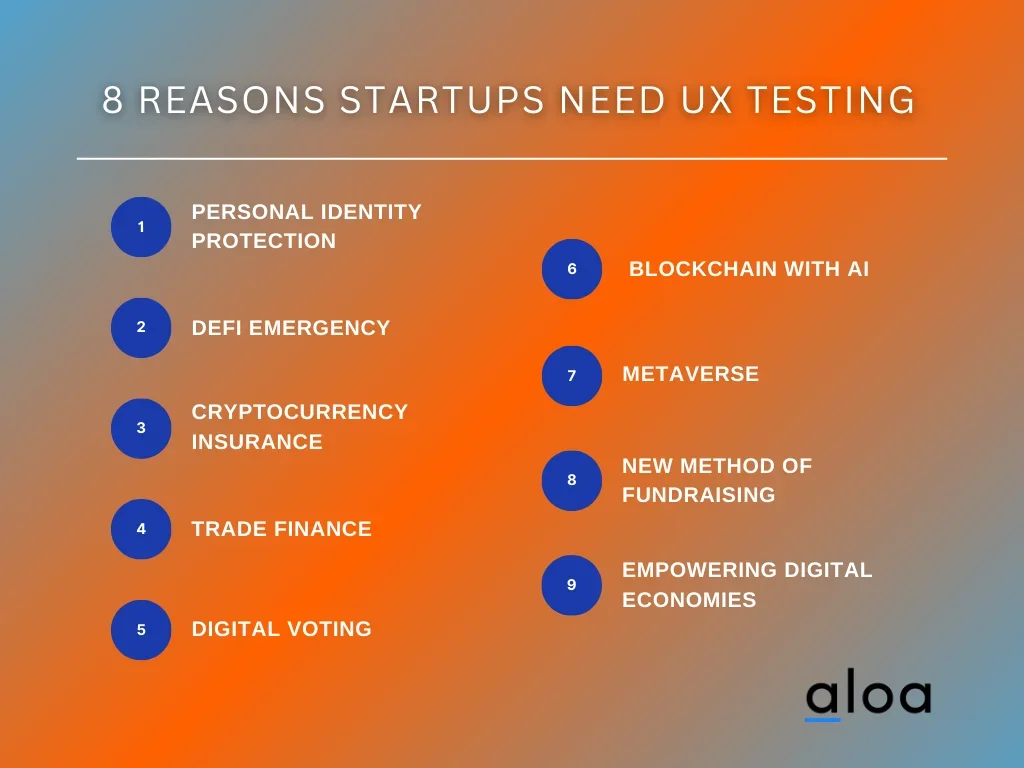
1. Defi Emergency
Decentralized finance, known as DeFi, transforms traditional financial services using blockchain technology. This allows financial institutions to offer better liquidity and growth opportunities in capital markets. DeFi is a broad term that includes smart contracts, tokens, and digital currencies to revolutionize financial services.
Integrating blockchain technology in DeFi platforms enhances automation, digitization, and transparency. It enables greater decentralization in financial services by eliminating intermediaries and facilitating market liquidity. Moreover, it makes transactions faster, cheaper, and more secure. With cryptocurrencies like Bitcoin and Ethereum in DeFi platforms, users can access financial services without relying on centralized authorities.
DeFi, in collaboration with blockchain, has various use cases, such as lending and borrowing platforms, decentralized exchanges, leading crypto exchange platforms including the best crypto exchange Australia, prediction markets, and insurance protocols. It can potentially democratize access to financial services for people currently excluded from traditional banking systems. The emergence of DeFi is changing the world of finance by offering an open system that provides equal opportunities for everyone with an internet connection.
2. Cryptocurrency Insurance
Blockchain technology plays a crucial role in revolutionizing the landscape of cryptocurrency insurance, enhancing its efficiency, transparency, and security. Cryptocurrency insurance provides coverage for virtual assets lost or stolen under specific circumstances. Through the implementation of blockchain use cases, the entire lifecycle of cryptocurrency insurance policies can be seamlessly managed.
Smart contracts, a key feature of blockchain use cases, facilitate the automated and transparent execution of insurance policies, ensuring that terms and conditions are met before claims are processed. The decentralized nature of blockchain eliminates the need for intermediaries, reducing the risk of fraud and enhancing the overall trustworthiness of cryptocurrency insurance.
Furthermore, the immutability of blockchain ensures that once data is recorded, it cannot be altered, providing an auditable and tamper-proof record of insurance transactions. This streamlines the claims process and instills confidence in policyholders, fostering a more robust and reliable ecosystem for cryptocurrency insurance. The unparalleled security features embedded in blockchain technology fortify the resilience of cryptocurrency insurance, creating a foundation for a more resilient and future-proof financial ecosystem.
3. Trade Finance
The current trade finance procedures, characterized by outdated analog paper methods, could be more effective and susceptible to vulnerabilities, such as the lack of a reliable central authority, which can lead to fraudulent activities. Blockchain use cases have the potential to transform trade finance by digitizing the process, resulting in the following:
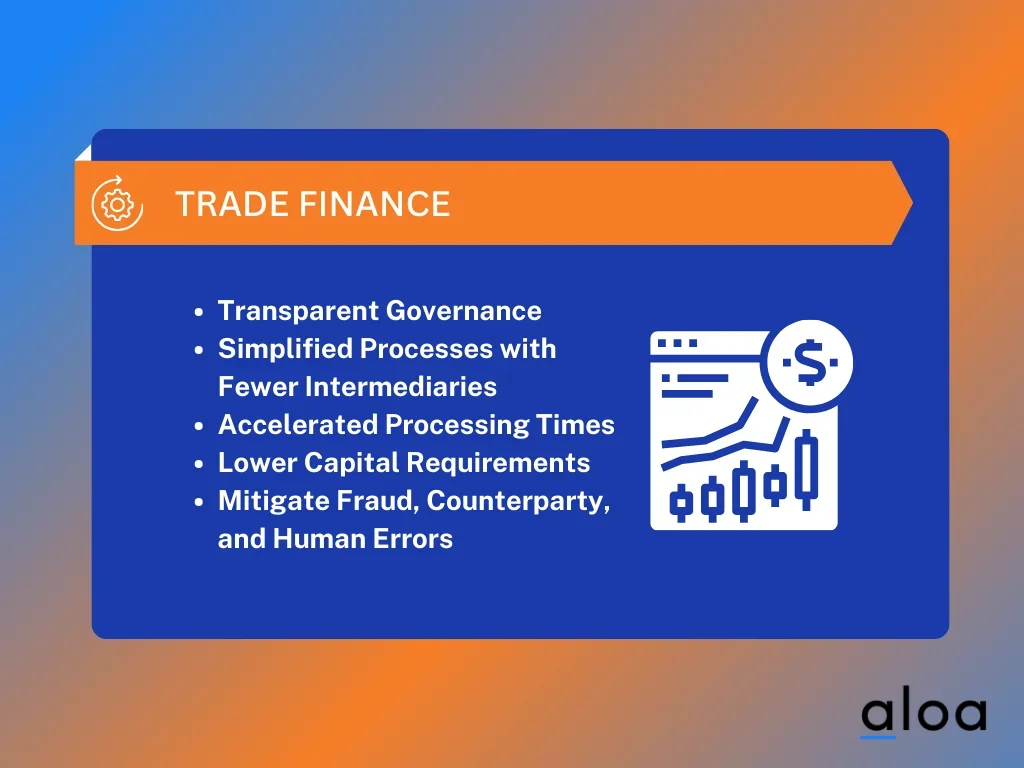
- Transparent Governance: Implementing blockchain ensures a clear and accountable governance structure, enhancing transparency in trade transactions.
- Simplified Processes with Fewer Intermediaries: Blockchain reduces complexity by streamlining processes, minimizing the need for numerous intermediaries, and simplifying the overall trade workflow.
- Accelerated Processing Times: The digitization of trade finance through blockchain leads to faster transaction processing, significantly reducing the time required for trade-related activities.
- Lower Capital Requirements: Leveraging blockchain in trade finance diminishes the need for extensive capital, making it a cost-effective solution for businesses engaged in international trade.
- Mitigated Risks of Fraud, Counterparty Issues, and Human Errors: Blockchain technology enhances security, lowering the risks associated with fraud, counterparty disputes, and errors caused by human intervention.
4. Digital Voting
Capitalizing on the inherent features of blockchain use cases, digital voting platforms emerge as a transformative solution to address critical challenges linked with conventional voting methodologies. The decentralized and immutable characteristics of blockchain play a pivotal role by ensuring that once a vote is recorded, it remains unalterable, establishing robust security measures against tampering or fraudulent activities.
This technology significantly enhances transparency as every participant in the network can independently verify the integrity of the voting process, fostering trust in the electoral system. Moreover, the implementation of smart contracts, enabled by blockchain, automates key aspects of the voting process, such as verification and counting. This expedites the electoral procedure and contributes to the overall reliability and efficiency of digital voting.
Incorporating blockchain into voting streamlines the process and instills confidence in the democratic system. The innovative application of blockchain fosters a resilient foundation for democratic practices, ensuring the sanctity of each vote and reinforcing the principles of fairness and accountability in the electoral landscape.
5. Blockchain with AI
The convergence of blockchain technology and Artificial Intelligence (AI) has the potential to revolutionize industries. Integrating blockchain with AI can provide several significant benefits, such as enhanced data security. The secure data storage offered by blockchain technology can prevent unauthorized access and safeguard sensitive AI data.
Another advantage of combining blockchain with AI is improved machine learning. By storing data securely on a blockchain network, machine learning models can access reliable and verified data, which enhances their accuracy and performance. Moreover, blockchain platforms offer automation in data governance, ensuring transparency and integrity in data management - an essential requirement for AI applications.
Decentralized data storage is another benefit that distributed ledger technology offers to the integration of blockchain with AI. This feature allows multiple nodes to store and access AI data, reducing dependence on a central authority while enhancing security and data availability. The combination of these features makes it possible for organizations to leverage the power of both technologies to revolutionize their operations, automate processes, reduce costs, and improve efficiency.
6. Metaverse
The Metaverse has swiftly increased prominence, attracting industry giants like Facebook and Microsoft. Leveraging cutting-edge technologies such as Augmented Reality (AR), Virtual Reality (VR), and Blockchain, these companies are crafting immersive digital experiences. The Metaverse's disruptive impact extends across various sectors like fashion, gaming, healthcare, and e-commerce. As a crucial foundation, blockchain technology ensures a secure and transparent ecosystem within this digital frontier. Below are some of its benefits.
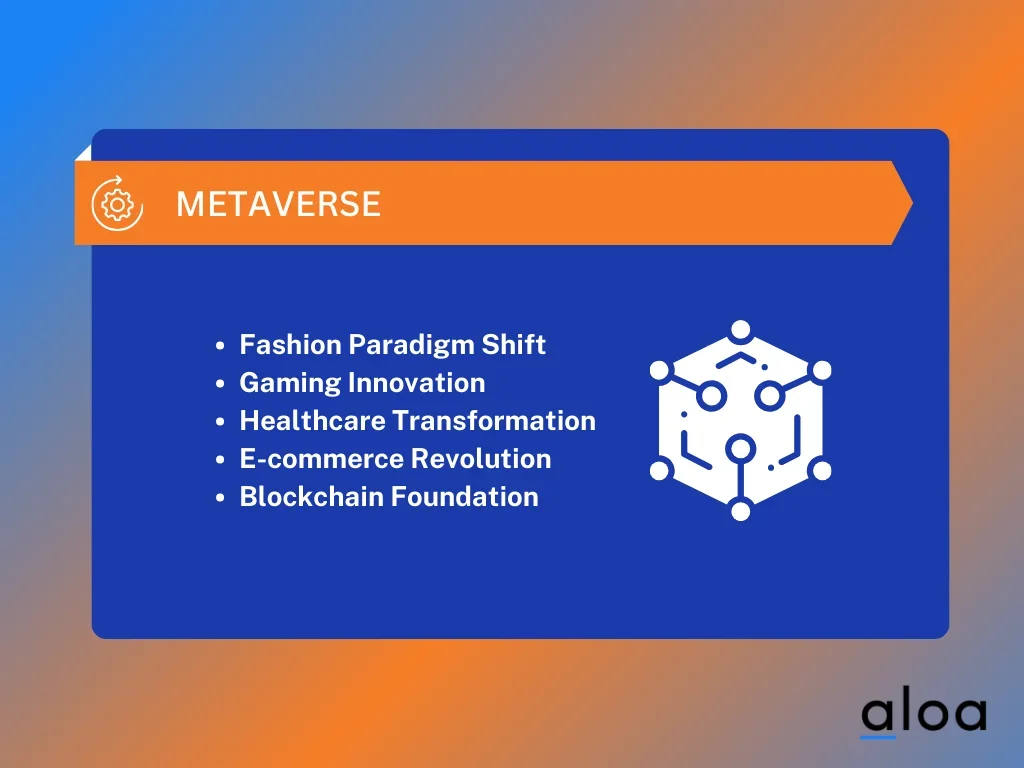
- Fashion Paradigm Shift: Blockchain uses cases ensure a secure and transparent record of interactions within virtual wardrobes and revolutionary digital fashion experiences.
- Gaming Innovation: Blockchain ensures secure and transparent transactions, facilitating an unparalleled gaming experience.
- Healthcare Transformation: In virtual medical consultations and therapeutic interventions within immersive digital spaces, Blockchain fosters trust and transparency, enhancing the efficiency and reliability of healthcare processes.
- E-commerce Revolution: Blockchain use cases eliminate intermediaries and ensure secure transactions, streamlining processes for interactive and personalized shopping experiences.
- Blockchain Foundation: Ensuring security and transparency, blockchain eliminates intermediaries and provides a verifiable record of transactions within the Metaverse.
7. New Method of Fundraising
Blockchain technology has ushered in a new era in fundraising, bringing transparency, global connectivity, and efficiency to the process. Explore the critical ways in which blockchain is transforming fundraising:
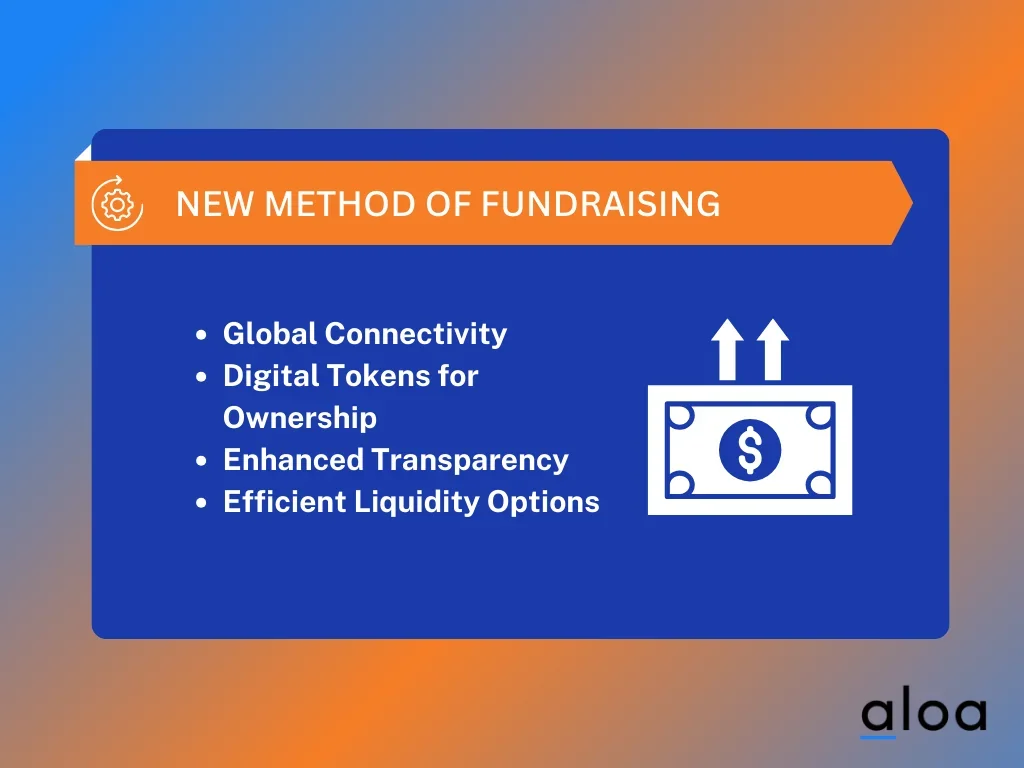
- Global Connectivity: Fundraising dynamics have been revolutionized by blockchain use cases, particularly in connecting emerging technology in businesses, notably startups, with potential investors on a worldwide scale. Blockchain platforms are pivotal in breaking geographical barriers and facilitating access to diverse global capital markets.
- Digital Tokens for Ownership: Creating digital tokens representing ownership or utility in assets, providing liquidity and fractionalization for traditionally illiquid assets.
- Enhanced Transparency: By diminishing information asymmetry between investors and businesses, blockchain use cases foster a more equitable and trust-driven relationship, establishing a level playing field for all stakeholders involved.
- Efficient Liquidity Options: Blockchain networks further enhance the efficiency of fundraising processes by providing faster and more accessible liquidity options. This proves advantageous for both businesses seeking capital and investors looking for streamlined investment opportunities.
8. Personal Identity Protection
Blockchain technology provides a decentralized data security and integrity solution by storing personal data on a blockchain network. This gives individuals greater control over their information, preventing unauthorized access and ensuring transparency in data management. Blockchain use cases also provide encryption, enhancing cybersecurity and data storage for personal information. This makes it less vulnerable to potential breaches and provides an added layer of protection against cybercriminals.
With data distributed across a decentralized network, the risk of a single point of failure is significantly reduced, contributing to a more resilient and fault-tolerant data storage solution. This resilience is crucial in safeguarding personal information from unforeseen events or malicious attacks.
By leveraging blockchain technology, individuals secure their sensitive personal information and actively participate in shaping a future where data security is synonymous with decentralization and transparency. The transformative impact of blockchain extends beyond individual data protection, laying the groundwork for a more trustworthy and secure digital landscape.
9. Empowering Digital Economies
In today's digital economies, blockchain use cases are transformative, especially in benefiting creators and small cooperatives. Take, for instance, the recent strike in the entertainment industry where writers and actors demanded better pay and AI integration in contracts after 15 years, signifying increased power in the emerging gig economy.
Blockchain's decentralized nature reshapes digital landscapes, which is evident in platforms like Zora's NFT marketplaces and CreatorDAO's decentralized autonomous organizations. These blockchain-powered solutions empower creators by providing direct access to online marketplaces, ensuring transparent compensation for their contributions.
The impact of blockchain extends to allowing artists to tokenize their work through NFTs, establishing a unique digital identity and enabling them to retain a more significant share of resale profits. Blockchain use cases liberate creators from centralized constraints, offering a global audience, transparency, and security.
How Blockchain Technology Benefits Your Industry: Other Blockchain Use Cases
Revolutionizing industries, blockchain use cases offer numerous benefits to various sectors. Explore how blockchain can benefit these industries below.
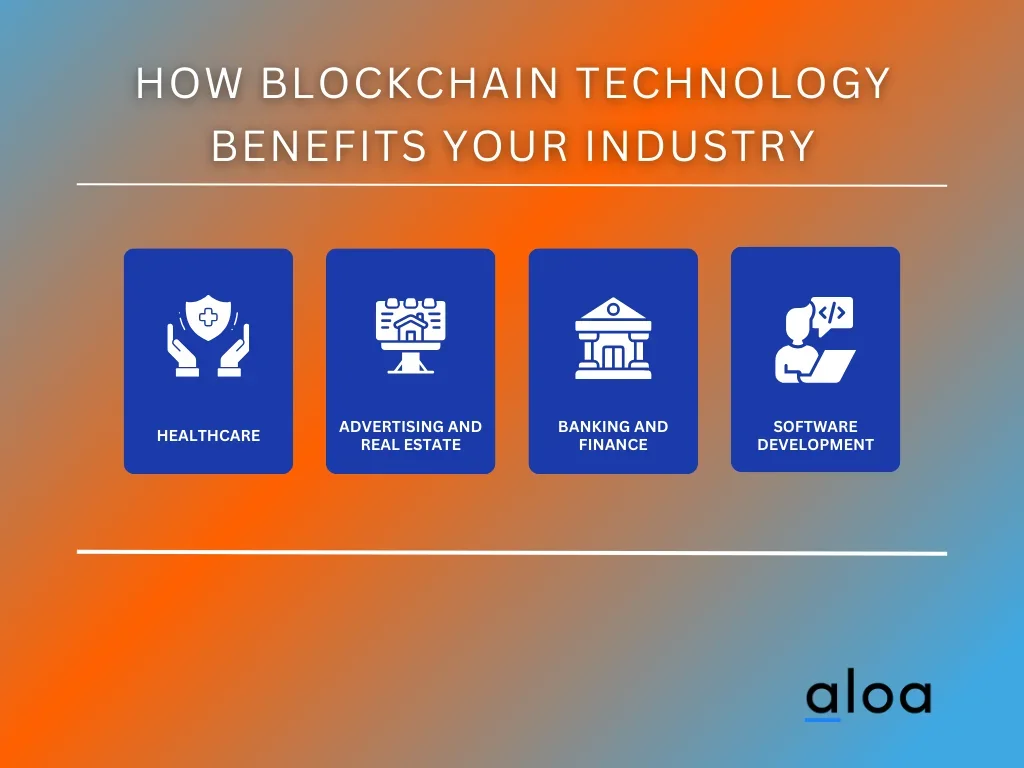
Healthcare
Blockchain technology has emerged as a game-changer in the healthcare industry by providing secure storage for medical records and ensuring data integrity. Its adoption offers several benefits to patients, medical professionals, and healthcare providers as it enhances transparency and security in personal data management. The distributed ledger technology of blockchain optimizes inventory management, improving healthcare supply chains’ efficiency.
Blockchain use cases in healthcare go beyond record-keeping as it ensures data security and privacy for all stakeholders involved. By leveraging this revolutionary technology, the healthcare industry can streamline operations and data management, leading to better patient outcomes.
Moreover, blockchain technology expedites clinical trials by providing an immutable patient data record, reducing administrative errors and delays. This can lead to faster drug development and approval processes, ultimately benefiting patients who require life-saving treatments.
Advertising and Real Estate
Blockchain technology has emerged as a disruptive force in the advertising and real estate industries, ushering in transformative changes and offering many benefits. From enhancing security and transparency to automating transactions through smart contracts, blockchain use cases have revolutionized how business is conducted in these sectors. Below are some of the benefits that blockchain offers.
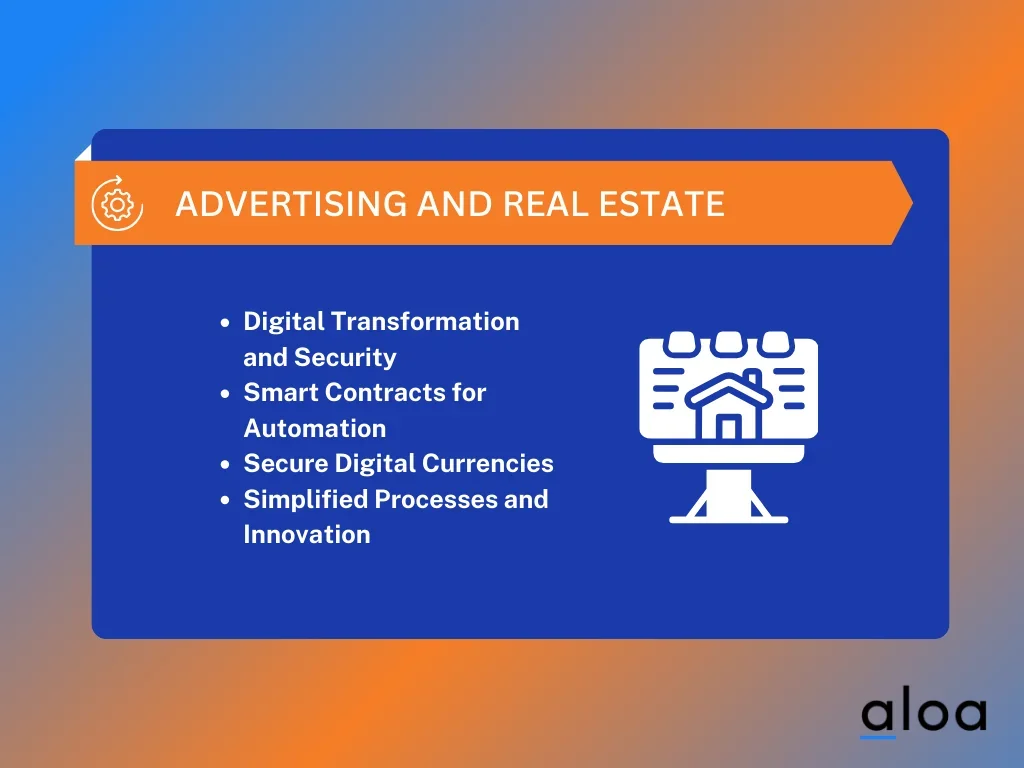
- Digital Transformation and Security: Blockchain technology drives digital transformation for each transaction, offering enhanced security, transparency, and automation.
- Smart Contracts for Automation: Blockchain platforms employ smart contracts, automating advertising and real estate transactions and diminishing the reliance on intermediaries, ensuring heightened security and efficiency.
- Secure Digital Currencies: Blockchain's encryption capabilities secure digital currencies used in advertising and real estate transactions, reducing the risk of fraud and fostering transparency.
- Simplified Processes and Innovation: Blockchain uses cases bring significant innovation by simplifying complex procedures like property verification and paper documentation while streamlining processes such as rent payment or mortgage applications.
Banking and Finance
The transparent nature of blockchain platforms ensures secure financial transactions that reduce the risk of fraudulent activities and information asymmetry. This technology also automates financial processes like payments, clearing, and settlement, reducing operational costs while increasing efficiency.
In addition to these advantages, blockchain use cases provide access to global capital markets for financial institutions, promoting capital growth, liquidity, and greater transparency. Furthermore, fintech companies are developing innovative solutions like digital wallets, crypto portfolio trackers, peer-to-peer lending platforms, and decentralized exchanges.. These innovations are revolutionizing the financial industry by providing more accessible and secure financial services to people worldwide.
As a result of these benefits, the banking and finance industry will likely continue benefiting from blockchain technology in the coming years. This technology has opened up new business opportunities to streamline their operations and offer more efficient services. Blockchain's potential is vast, and its impact on the future of finance could be significant in many ways. Blockchain-Ads for fintech advertising are also emerging as a powerful tool, enabling targeted, transparent, and fraud-resistant campaigns that align with the decentralized ethos of the fintech space.
Software Development
Blockchain enhances digital supply chain management by improving data security and transparency while enabling real-time visibility of digital assets. Blockchain use cases help protect against piracy and ensure the security of software development data, safeguarding content creators' royalties as they utilize advanced encryption technologies.
Efficient data storage is another vital benefit of blockchain in software development, allowing blockchain developers to securely store, access, and share data without concerns over data silos. This improves collaboration within the industry, enabling teams to work together on projects more efficiently. Furthermore, blockchain's distributed ledger technology allows for transparent and auditable record-keeping, reducing disputes and enhancing trust in software development processes.
Expanding on these advantages, the integration of blockchain in supply chain and software development not only streamline processes but also lays the foundation for a more resilient and innovative industry. The enhanced security and transparency offered by blockchain contribute to creating a digital ecosystem where trust is inherent, fostering a collaborative environment that accelerates progress and ensures the integrity of digital assets throughout their lifecycle.
Key Takeaway
Blockchain technology is reshaping industries, boasting data storage, security, and transparency. Its decentralized ledger technology, automation, and encryption capabilities offer numerous use cases across different sectors. From personal identity protection to digital voting, trade finance to healthcare record-keeping, blockchain can transform business practices and usher in the digital transformation era.
As we embrace today's digital age, integrating blockchain use cases in our industries further enhances their capabilities to be more efficient and effective while providing quality services. Knowing blockchain use cases and how to apply them in current technologies will surely give your company a considerable advantage over competitors. Not only will it increase the output quality, but it will also save you valuable resources.
Eager to adopt blockchain tech in your business operations? Subscribe to our email list via the Aloa blog page for updates and insights on the latest developments in blockchain technology. Aloa remains on top of advancements in offering tailored solutions and connections to ensure clients stay ahead of the curve in this intricate blockchain market.

